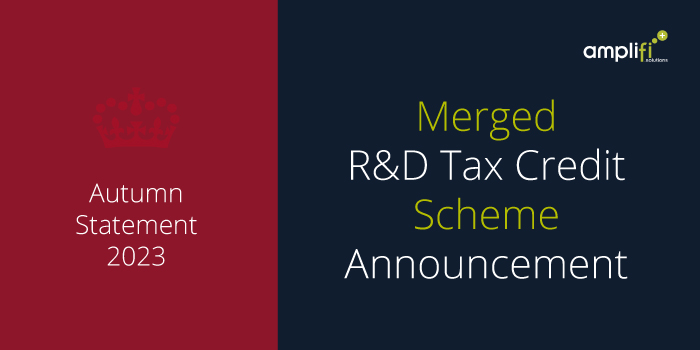Merged R&D Tax Credit Scheme Announced in Autumn Statement 2023
On Wednesday’s (22/11/23) Autumn Statement, Jeremy Hunt has unveiled plans for a new merged R&D tax credit incentive. The upcoming unified scheme will incorporate elements from both the current RDEC and SME schemes.
Below is an overview of the key features of the new merged scheme and other R&D tax credit factors to be implemented from April 2024 onward:
New R&D Tax Credit Merged Scheme (for accounting periods commencing 1 April 2024):
- Contracted R&D:
In the new merged scheme, the company making the decision to undertake R&D can claim for contracted R&D. For example, if a software company contracted to deliver a solution decides to engage in R&D for that solution, they are eligible to claim. - Subsidised Expenditure:
Similar to the existing RDEC scheme, the merged scheme will not reduce support if a company receives grants covering a portion of its R&D expenses. - Loss-making Companies:
The notional tax rate for loss-making entities in the merged scheme will be lowered from 25% (as in the current RDEC scheme) to 19%. - Tax Relief Delivery:
Tax relief will be administered through a taxable above-the-line expenditure credit, which will be implemented at the current RDEC rate of 20%. - Payment Process:
Third parties cannot be nominated as payees for R&D tax credit payments, which means, in most cases, R&D reliefs will only be paid directly to the claimant company.
Additional Relief for R&D Intensive Companies:
In the Spring Budget, a new enhanced rate of tax relief of £27 for every £100 of qualifying R&D spend was announced for R&D intensive loss-making SMEs, who spent 40% or more of total outgoings on R&D. In the Autumn Statement, the threshold has reduced from the 40% to 30%.
It was announced that provisions will also be introduced to allow an intensive SME that successfully claims intensive relief in one year to claim it in the following year, addressing concerns about exceptional spending that could impact the SME’s intensity ratio and create uncertainty.
Overseas Expenditure Restrictions:
Postponed restrictions on overseas expenditure, including subcontractors and externally paid workers, are scheduled to come into effect from 1st April 2024.
Compliance Measures:
Further measures will be taken by the HMRC to address high levels of non-compliance in R&D incentives.
Full details on all the R&D Tax Credit Changes



